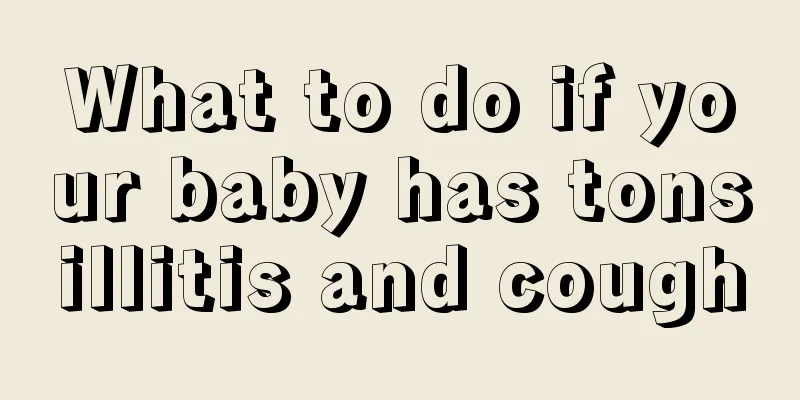Why does my baby have a high fever?

|
If the baby always has a high fever, parents should pay attention to analyzing the causes. The most common causes are colds, ENT inflammation, and viral infections such as pityriasis rosea. Therefore, after clarifying the cause, parents should pay attention to prevention and treatment. 1. Cold Both common cold and influenza are the most common diseases in babies. Both bacterial and viral infections are possible. The symptoms vary, including fever, loss of appetite, gastrointestinal discomfort, diarrhea, and ear, nose and throat problems. The doctor will give you "symptomatic treatment" drugs, and if you want to rest more and drink plenty of water, you will usually recover in 3 to 5 days. However, if not properly cared for, complications such as otitis media, encephalitis, meningitis, etc. may occur, and there is a risk of a high fever of over 39 degrees. 2. Ear, nose and throat inflammation Ear, nose and throat problems usually cause inflammation, which leads to redness and swelling. It is a viral infection. Symptoms vary, common ones include fever, cough, runny nose, red and swollen throat (babies are usually unwilling to eat), etc. The doctor will give you "symptomatic treatment" drugs, and if you want to rest more and drink plenty of water, you will usually recover in 3 to 5 days. The disease is prone to complications such as otitis media, atopic otitis, pneumonia, etc., and there is also a risk of high fever above 39 degrees. 3. Roseola It is named after the roseola virus infection. Babies around 1 year old are most likely to get it. The typical symptom is an unexplained high fever (over 39°C) that lasts about 3 to 4 days, followed by a rash (the fever will subside at this time). The rash usually disappears slowly without leaving any scars or other complications, so parents do not need to worry. 4. Get vaccinated Many babies have mild fevers due to vaccinations, but more obvious fevers usually occur after the injection of "diphtheria, whooping cough, and tetanus" vaccines. If you are unwell or have a cold, it is not suitable to take your baby for vaccination to avoid confusion about the symptoms. The observation period for fever caused by vaccination is 72 hours. If it exceeds this period, the fever is no longer caused by the vaccine, and parents need to make another judgment. 5. Sepsis It is a disease in which bacteria invade the bloodstream. It is usually the result of inbreeding, poor innate immunity, or use of high doses of steroids. Patients with sepsis have a 1/3 chance of developing meningitis, so it ranks second in risk. 6. Urinary tract infection The disease is most common in boys and girls under 1 year old. For baby girls, it is usually caused by feces or diapers; for baby boys, it is caused by bladder and ureteral reflux. Apart from the fact that the fever can easily reach above 38.5, it is not easy to detect from the outside. Because it is a bacterial infection, medical treatment usually includes antibiotics, which takes about 2 weeks to heal. Possible complications are impaired renal function and renal suppuration. |
<<: What should I do if my child has a sore throat? What are the simplest methods?
>>: How to use diet therapy for children's colds
Recommend
Tips for two-month-old babies to wake up
Babies fussing during sleep is a manifestation of...
What to do if a four-month-old child has anemia?
Maybe many children have suffered from anemia rec...
Neonatal hypothermia therapy
Hypothermia therapy is a method that mainly contr...
Symptoms of congenital heart disease in newborns
I don’t know if you have heard of congenital hear...
How to solve the problem of blue veins on the bridge of the child's nose
Many people are used to the appearance of blue ve...
What to do if your 9-month-old baby has anorexia
When the baby is just born, generally speaking, h...
How to treat baby tooth decay?
More and more babies are suffering from tooth dec...
What is the reason for children's frequent urination?
Parents will be very worried when their children ...
Children's urine is foamy
Mothers need to be particularly careful when taki...
What to do if your one and a half year old baby has a stuffy nose?
There are many reasons for a baby's nasal con...
What are the reasons why children are lonely?
Many parents hope that their children are extrove...
Hard pimples on baby's body
During the growth and development stage, babies w...
Treatment for baby shaking head before sleeping
Nowadays, it is not uncommon to see babies shakin...
Why can't my baby stick out his tongue?
Newborn babies learn about the world through thei...
What should I do if my child dislocates his wrist?
Everyone knows that most children like to play an...









